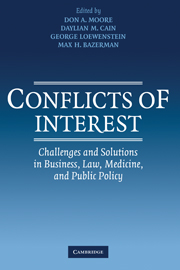Introduction
Published online by Cambridge University Press: 04 August 2010
Summary
Many professionals face a conflict between their professional responsibilities to protect the interests of their constituents, shareholders, patients, clients, or students, and their own self-interest. Under the best of circumstances, they stumble along, making implicit tradeoffs that represent some kind of rough compromise between these competing motives. The auditor may give clients some breaks but blow the whistle on cases of egregious corruption. The doctor accepts trinkets from a pharmaceutical company and may even prescribe that company's drug when it is perfectly equivalent to the competition's. The academic serving as an expert witness tries to craft her argument to satisfy the side she is working on but avoids saying anything that she vehemently disagrees with.
At times, however, this fragile equilibrium seems to break down, either within a single profession or more broadly. Exactly why this happens is not well-understood, but it is clear that we are living in such an era. Although conflicts of interest have been a fixture in the economic and political landscape almost from the outset of capitalism, the negative consequences of conflicts of interest seem to have worsened considerably in recent history. The most notorious of these consequences have been those involving the accounting industry. The accounting industry and the audit function it serves act as the primary safeguard for investors against malfeasance by corporate managers, but this function seems to have broken down in recent decades, contributing to a long string of scandals at major American corporations, including Enron, WorldCom, Global Crossing, Adelphia, and many others.
- Type
- Chapter
- Information
- Conflicts of InterestChallenges and Solutions in Business, Law, Medicine, and Public Policy, pp. 1 - 10Publisher: Cambridge University PressPrint publication year: 2005
References
- 2
- Cited by



